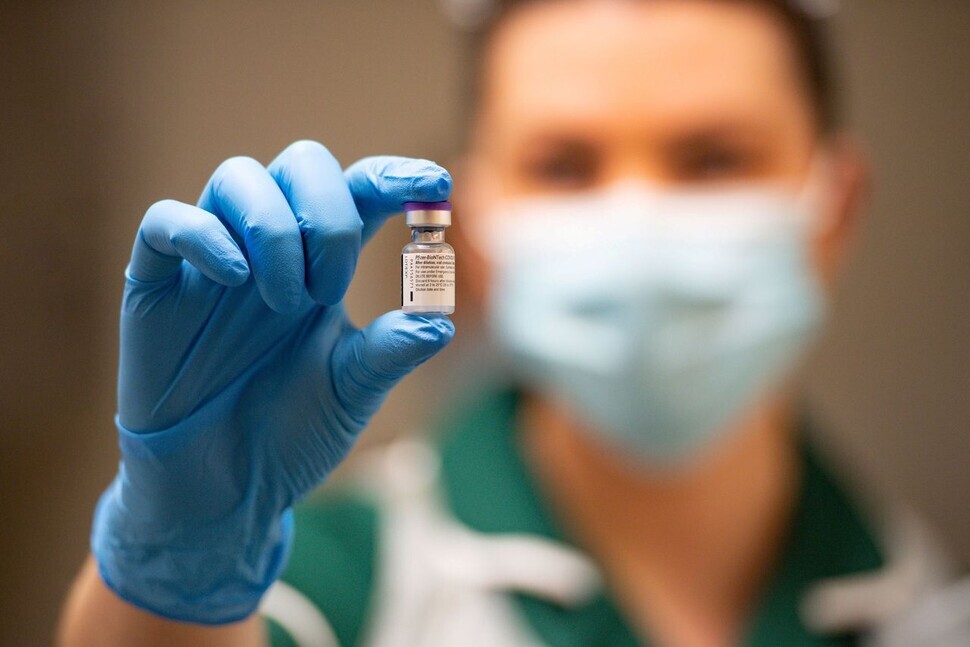hankyoreh
Links to other country sites 다른 나라 사이트 링크
UK regulators advise against people with history of allergies getting Pfizer vaccine

British pharmaceutical regulators are advising that people with a history of serious allergic reactions to foods or vaccines and other medicines should not be administered the COVID-19 vaccine co-developed by Pfizer and BioNTech.
June Raine, chief executive of the UK’s Medicines and Healthcare Products Regulatory Agency (MHRA), was quoted by a Reuters report on Dec. 10 as saying that “any person with a history of anaphylaxis to a vaccine, medicine or food should not receive the Pfizer BioNTech vaccine.”
Anaphylaxis is a severe allergic reaction in which contact with even extremely small doses of a particular substance such as a vaccine or food item results in symptoms such as rashes and difficulty breathing. Two staffers under the UK’s National Health Service (NHS) showed strong allergic reactions after being administered the Pfizer vaccine on Dec. 8. The employees in question had been severely vulnerable to allergies before and carried emergency treatments with them at all times. While they presented an anaphylactic reaction after receiving the vaccine, they are currently recovering, The Guardian reported.
According to a Dec. 10 report drafted by the US Food and Drug Administration (FDA) based on information provided by Pfizer, the allergic reaction rate for the group administered the vaccine was 0.63%, or slightly higher than the 0.51% for the group receiving a placebo. But CNN reported that Pfizer excluded people with histories of anaphylaxis and other severe allergic reactions from its clinical trials altogether.
In US clinical trials, transient cases of Bell’s palsy were observed in four out of 21,720 people given the Pfizer vaccine. But US public health authorities responded positively to the vaccine, noting that this incidence of facial paralysis fell below the incidence rate relative to the population. US Health Secretary Alex Azar said on Dec. 9 that the FDA would be able to grant approval for emergency use of the Pfizer vaccine by this weekend.
Also on Dec. 9, the Canadian government became the third to approve emergency use of the Pfizer vaccine, after the UK and Bahrain. For now, Canada is recommending the vaccine only be administered to those 16 years of age and older and not be given to anyone with a history of allergic reactions.
By Cho Ki-weon, staff reporter
Please direct comments or questions to [english@hani.co.kr]

Editorial・opinion
![[Editorial] Intensifying US-China rivalry means Seoul must address uncertainty with Beijing sooner than later [Editorial] Intensifying US-China rivalry means Seoul must address uncertainty with Beijing sooner than later](https://flexible.img.hani.co.kr/flexible/normal/500/300/imgdb/original/2024/0517/8117159322045222.jpg) [Editorial] Intensifying US-China rivalry means Seoul must address uncertainty with Beijing sooner than later
[Editorial] Intensifying US-China rivalry means Seoul must address uncertainty with Beijing sooner than later![[Column] When ‘fairness’ means hate and violence [Column] When ‘fairness’ means hate and violence](https://flexible.img.hani.co.kr/flexible/normal/500/300/imgdb/original/2024/0516/7417158465908824.jpg) [Column] When ‘fairness’ means hate and violence
[Column] When ‘fairness’ means hate and violence- [Editorial] Yoon must stop abusing authority to shield himself from investigation
- [Column] US troop withdrawal from Korea could be the Acheson Line all over
- [Column] How to win back readers who’ve turned to YouTube for news
- [Column] Welcome to the president’s pity party
- [Editorial] Korea must respond firmly to Japan’s attempt to usurp Line
- [Editorial] Transfers of prosecutors investigating Korea’s first lady send chilling message
- [Column] Will Seoul’s ties with Moscow really recover on their own?
- [Column] Samsung’s ‘lost decade’ and Lee Jae-yong’s mismatched chopsticks
Most viewed articles
- 1[Editorial] Transfers of prosecutors investigating Korea’s first lady send chilling message
- 2[Exclusive] Unearthed memo suggests Gwangju Uprising missing may have been cremated
- 3[Column] US troop withdrawal from Korea could be the Acheson Line all over
- 4‘Shot, stabbed, piled on a truck’: Mystery of missing dead at Gwangju Prison
- 5S. Korea “monitoring developments” after report of secret Chinese police station in Seoul
- 6[Column] When ‘fairness’ means hate and violence
- 7[Editorial] Intensifying US-China rivalry means Seoul must address uncertainty with Beijing sooner t
- 8US has always pulled troops from Korea unilaterally — is Yoon prepared for it to happen again?
- 9[Column] How to win back readers who’ve turned to YouTube for news
- 10Xi, Putin ‘oppose acts of military intimidation’ against N. Korea by US in joint statement